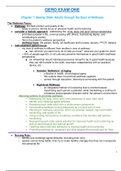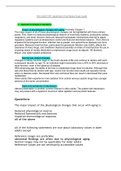Gero actual exam - Study guides, Class notes & Summaries
Looking for the best study guides, study notes and summaries about Gero actual exam? On this page you'll find 23 study documents about Gero actual exam.
Page 3 out of 23 results
Sort by

-
NSG 6420: FNP I Adult/Gero Final Review Study Guide,GRADED A
- Exam (elaborations) • 107 pages • 2021
-
- $17.49
- 1x sold
- + learn more
NSG 6420: FNP I Adult/Gero Final Review Study Guide 1. General Concepts in Geriatrics Impact of physiological changes with aging: Kennedy Chapter 1. The major impact of all of these physiological changes can be highlighted with three primary points. First, there is a reduced physiological reserve of most body systems, particularly cardiac, respiratory, and renal. Second, there are reduced homeostatic mechanisms that fail to adjust regulatory systems such as temperature control and fluid...

-
GERO EXAM ONE
- Other • 28 pages • 2021
-
- $15.49
- + learn more
GERO EXAM ONE Chapter 1: Seeing Older Adults through the Eyes of Wellness The Wellness Focus: ● Wellness: the best function and quality of life ○ helps to avoid a narrow focus on physical health and functioning ● consider a holistic approach - addressing the: mind, body and spirit interconnectedness ○ promotes purpose in life, communicating with others, maintaining dignity, and contributing to society ○ this is the patient’s wellness perspective ○ wellness team: the pa...

-
NSG 6420: FNP I Adult/Gero Final Review Study Guide, South University, Savannah | RATED A+
- Exam (elaborations) • 54 pages • 2021
-
- $10.99
- + learn more
NSG 6420: FNP I Adult/Gero Final Review Study Guide 1. General Concepts in Geriatrics Impact of physiological changes with aging: Kennedy Chapter 1. The major impact of all of these physiolog ical changes can be highlighted with three primary points. First, there is a reduced physiological reserve of most body systems, particularly cardiac, respiratory, and renal. Second, there are reduced homeostatic mechanisms that fail to adjust regulatory systems such as temperature control and fluid and ele...

That summary you just bought made someone very happy. Also get paid weekly? Sell your study resources on Stuvia! Discover all about earning on Stuvia


